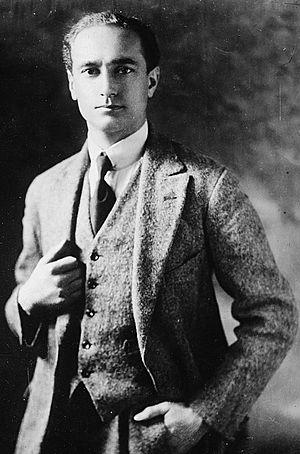Paul Dukes facts for kids
Quick facts for kids Sir Paul Dukes |
|
|---|---|
| The Man with a Hundred Faces | |
 |
|
| Allegiance | United Kingdom White Movement |
| Service | Secret Intelligence Service. |
| Operation(s) | Operation Kronstadt |
| Codename(s) | ST-25 |
|
|
|
| Birth name | Paul Henry Dukes |
| Born | 10 February 1889 Bridgwater, Somerset, England |
| Died | 27 August 1967 (aged 78) Cape Town, South Africa |
| Spouse |
|
Sir Paul Henry Dukes (born February 10, 1889 – died August 27, 1967) was a brave British spy and author. He worked for MI6, which is the UK's foreign intelligence agency.
Contents
Early Life and Family Background
Paul Henry Dukes was born in Bridgwater, England. He was one of five children. His father, Edwin Joshua Dukes, was a clergyman. His mother, Edith Mary Pope, was very smart and earned a university degree. Sadly, she passed away when Paul was young.
Paul had two famous brothers. Ashley Dukes became a well-known playwright. Cuthbert Dukes was a respected doctor. His sister-in-law, Marie Rambert, was a famous ballet dancer.
Paul went to Caterham School. Later, he studied music at the Petrograd Conservatoire in Russia. He became a talented concert pianist.
Spy Career and Achievements
Paul Dukes first worked as a language teacher in Riga, Latvia. He then moved to St. Petersburg, Russia. Because he spoke Russian fluently, he was recruited by Mansfield Smith-Cumming. Smith-Cumming was the first head of MI6. Paul became a secret agent for Britain in Russia.
At this time, Russia was going through big changes. Paul helped many important White Russians escape. These were people who opposed the new government. He helped hundreds of them get to Finland.
The Man of a Hundred Faces
Paul Dukes was known as "The Man of a Hundred Faces." This was because he was very good at using disguises. He took on many different identities. This helped him sneak into several important groups. He joined the Communist Party of the Soviet Union. He also got into the Comintern and even the secret police, known as the CHEKA.
Dukes learned a lot about how the Politburo worked. The Politburo was the main decision-making group in the Soviet Union. He passed all this important information to British intelligence.
A Hero's Return
When he returned to Britain, Paul Dukes was celebrated as a hero. In 1920, King George V made him a knight. The King called Dukes "the greatest of all soldiers." Paul Dukes is still the only person to be knighted just for his spy work.
He briefly returned to being a spy in 1939. He helped find a Czech businessman who had disappeared. This happened after Nazi Germany took over Czechoslovakia. Paul wrote a book about this search called An Epic of the Gestapo.
Paul Dukes also helped bring yoga to the Western world.
Writing and Books
Paul Dukes wrote several books about his experiences. His book Red Dusk and the Morrow tells the story of the rise and fall of Bolshevism. He traveled around the world giving talks about this topic.
His other books include:
- (1922). Red Dusk and the Morrow: Adventures and Investigations in Red Russia.
- (1938). The Story of "ST 25": Adventure and Romance in the Secret Intelligence Service in Red Russia.
- (1940). An Epic of the Gestapo: The Story of a Strange Search.
- (1947). Come Hammer, Come Sickle!
- (1950). The Unending Quest: Autobiographical Sketches.
- (1958). Yoga for the Western World.
- (1960). The Yoga of Health, Youth and Joy: A Treatise on Hatha Yoga Adapted to the West.
Later Life
In 1922, Paul Dukes married Margaret Stuyvesant Rutherfurd. They divorced in 1929. He later married Diana Fitzgerald in 1959.
Sir Paul Dukes passed away on August 27, 1967, in Cape Town, South Africa. He was 78 years old.
 | May Edward Chinn |
 | Rebecca Cole |
 | Alexa Canady |
 | Dorothy Lavinia Brown |

